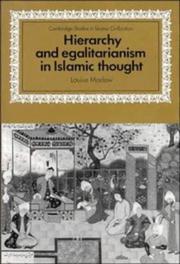| Listing 1 - 2 of 2 |
Sort by
|

ISBN: 0521564301 9780521894289 9780521564304 052189428X Year: 1997 Volume: *5 Publisher: Cambridge: Cambridge university press,
Abstract | Keywords | Export | Availability | Bookmark
 Loading...
Loading...Choose an application
- Reference Manager
- EndNote
- RefWorks (Direct export to RefWorks)
By examining a wide range of Arabic and Persian literature from the eighth to the thirteenth century, Louise Marlow shows the tension that existed between the traditional egalitarian ideal of early Islam, and the hierarchical impulses of the classical period. The literature demonstrates that while Islam's initial orientation was markedly egalitarian, the social aspect of this egalitarianism was soon undermined in the aftermath of Islam's political success, and as hierarchical social ideas from older cultures in the Middle East were incorporated into the new polity. Although the memory of its early promise never entirely receded, social egalitarianism quickly came to be associated with political subversion. On account of its originality and chronological scope, Louise Marlow's book will be of use to a wide readership of Islamic historians and of scholars assessing the impact of the modern Islamic revival.
Equality --- Social justice --- Social structure --- Occupational prestige --- History --- Religious aspects --- Islam --- -Equality --- -Occupational prestige --- -Social justice --- -Social structure --- -Organization, Social --- Social organization --- Anthropology --- Sociology --- Social institutions --- Justice --- Job status (Occupational prestige) --- Occupational hierarchy --- Occupational status (Occupational prestige) --- Prestige --- Egalitarianism --- Inequality --- Social equality --- Social inequality --- Political science --- Democracy --- Liberty --- -Islam --- Islam. --- History. --- -History --- Organization, Social --- Religious aspects&delete& --- Islamic countries --- Equality - Islamic countries - History. --- Equality - Religious aspects - Islam. --- Social justice - Islamic countries - History. --- Social structure - Islamic countries - History. --- Occupational prestige - Islamic countries - History. --- Equality (Islam) --- Equality - Islamic countries - History --- Equality - Religious aspects - Islam --- Social justice - Islamic countries - History --- Social structure - Islamic countries - History --- Occupational prestige - Islamic countries - History
Book
ISBN: 9781780766508 1780766505 9780857737557 Year: 2015 Publisher: London: Tauris Academis Studies,
Abstract | Keywords | Export | Availability | Bookmark
 Loading...
Loading...Choose an application
- Reference Manager
- EndNote
- RefWorks (Direct export to RefWorks)
Mohammad Abed al-Jabri is one of the most influential political philosophers in the contemporary Middle East. A critical rationalist in the tradition of Avincenna and Averroes, he emphasises the distinctive political and cultural heritage of the Arab world whilst rejecting the philosophical discourses that have been used to obscure its democratic deficit." "This volume introduces an English-language audience for the first time to writings that have had a major impact on Arab political thought. Wide-ranging in scope yet focused in detail, these essays interrogate concepts such as democracy, law, and human rights, looking at how they have been applied in the history of the Arab world, and show that they are determined by political and social context, not by Islamic doctrine." "Jabri argues that in order to develop democratic societies in which human rights are respected, the Arab world cannot simply rely on old texts and traditions. Nor can it import democratic models from the West. Instead, he says, a new tradition will have to be forged by today's Arabs themselves, on theirs."--Jacket.
Democracy - Arab countries --- Human rights - Arab countries --- Equality - Religious aspects - Islam --- Islam and state --- Arab countries - Politics and government - 1945 --- -Islam and state --- Democracy --- Human rights --- Islamic law --- Religion and politics --- Religious aspects --- Islam --- Political science --- Politics, Practical --- Politics and religion --- Religion --- Religions --- Civil law (Islamic law) --- Law, Arab --- Law, Islamic --- Law in the Qurʼan --- Sharia (Islamic law) --- Shariʻah (Islamic law) --- Law, Oriental --- Law, Semitic --- Mosque and state --- State and Islam --- State, The --- Ummah (Islam) --- Political aspects --- 297*35 --- 297*35 Islam en het Westen --- Islam en het Westen --- Equality --- Arab countries
| Listing 1 - 2 of 2 |
Sort by
|

 Search
Search Feedback
Feedback About UniCat
About UniCat  Help
Help News
News